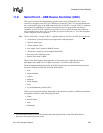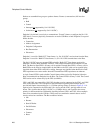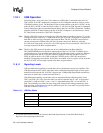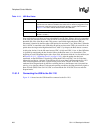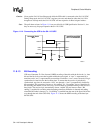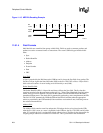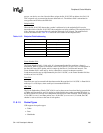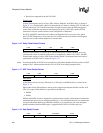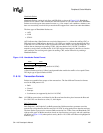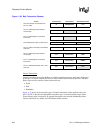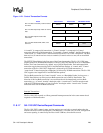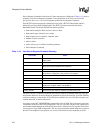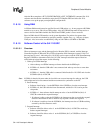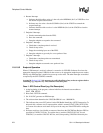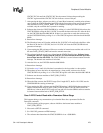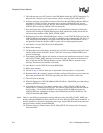
SA-1110 Developer’s Manual 267
Peripheral Control Module
Handshake Packet:
Handshake Packets consist of only Sync and PID fields, as shown in Figure 11-19. Handshake
Packets do not contain a CRC field because the PID contains its own 4-bit check field. Handshake
Packets are used to report data transaction status, e.g., flow control, stall conditions, whether or not
data was successfully received. Only transactions that support flow control can return handshakes.
The three types of Handshake Packets are:
• ACK
• NAK
• STALL
ACK indicates that a Data Packet was received without errors, i.e., without bit-stuffing, CRC, or
PID check errors. NAK indicates that the SA-1110 UDC was unable to accept data from the Host
or that the SA-1110 UDC had no data to transmit to the Host. NAK is also used by Endpoint 1 to
indicate that no interrupts are pending. STALL indicates that the SA-1110 UDC is unable to
transmit or receive data, and that the SA-1110 UDC requires intervention by the Host to clear the
stall condition. The receiving unit signals bit-stuffing, CRC, and/or PID errors by omitting a
Handshake Packet.
Figure 11-19. Handshake Packet Format
Special Packet
(not supported by the SA1110 UDC):
A Special Packet consists of a Host-issued preamble that enables bus traffic to low-speed Clients.
The single type of Special Packet is PRE.
11.8.1.6 Transaction Formats
Packets are assembled into groups to form transactions. The four different Transaction formats
used in the USB protocol are:
• Bulk
• Control
• Interrupt
• Isochronous (not supported by the SA-1110 UDC)
Note: All USB bus transactions are initiated by the Host and transfer takes place between the Host and
SA-1110 UDC one direction at a time, i.e., half-duplex.
Bulk Transactions
:
Both Endpoint 1 and Endpoint 2 use Bulk transactions. Bulk transactions guarantee error-free
transmission of data between the Host and SA-1110 UDC by using packet error detection and retry.
The three Packet Types used to construct Bulk transactions are: Token, Data, and Handshake. The
eight possible types of Bulk transactions, based on data direction, error types, and stall conditions,
are shown in Figure 11-20 (where packets sent by the SA-1110 UDC to the Host are highlighted in
boldface type).
8bits 8bits
Sync PID



